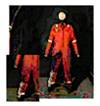
Incident Report Subject: RR883 - Vulnerability of Oil Contaminated Fire Retardant Overalls Date of Email report: Mon 08/08/2011 Report Detail:
After research, testing and comparisons, the JOIFF Specification on Multifunctional Heat and Flame Protective Work Wear was published in 2009. One of the requirements of this JOIFF Specification is that the material(s) used to manufacture the protective work wear to this specification shall be inherently flame resistant material(s).(Clause 2.2.1). Clause AA.2.2.1, in Appendix A of the Specification explains that the main reason for this requirement is that the flame resistant properties cannot be removed from inherently flame resistant material(s) for their lifetime whereas as flame retardant treatments to materials are provided by a chemical process and chemical processes can be reversed by other chemical and/or physical processes, their protective properties can diminish during use, including wash frequency. JOIFF reminds members that the JOIFF Handbook on Personal Protective Equipment (PPE) to protect against Heat and Flame, available in the English, Croatian and French languages and the JOIFF Specification for multifunctional heat and flame protective work wear, are available for free download from the JOIFF website. Overalls become oil-contaminated very rapidly in many work situations, particularly offshore, in some cases within one day. From time to time, there are significant hydrocarbon fires offshore (eg on the Rough Platform). There is evidence that frequent washing reduces the fire retardant properties of some materials, thereby increasing personal risk to persons and compromising their safety in a fire. Secondly, there is a problem with fires in the laundries offshore. Because of the large potential for escalation of fires offshore, the reduction of fuel loading and the prevention of ignition sources must remain a high priority. The presence of possibly flammable, oil-contaminated overalls with potential for self-heating exacerbates this problem. Therefore, an experimental trial has been commissioned to investigate the possible degradation of the fire performance of fire protective overalls. This began with, a review of national standards to identify a suitable measure of fire performance that can be used to measure possible loss of protection after laundering. This in turn was used to establish a test procedure to allow the comparison of new fire retardant material with laundered material, both stained and clean. This report and the work it describes were funded by the Health and Safety Executive (HSE). Its contents, including any opinions and/or conclusions expressed, are those of the authors alone and do not necessarily reflect HSE policy. Additional Documentation: |

